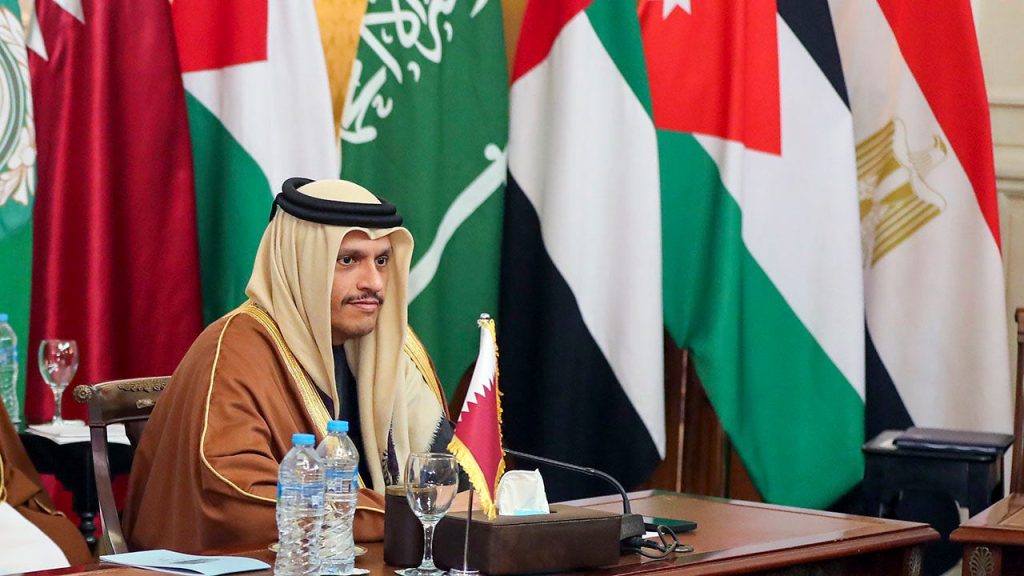The geopolitical landscape of the Middle East witnessed a significant development on Saturday as a coalition of influential Arab nations, including Qatar, Jordan, the United Arab Emirates, Saudi Arabia, and Egypt, along with key Palestinian and Arab League representatives, convened in Cairo to address the ongoing Gaza crisis. The meeting culminated in a joint statement that unequivocally rejected President Donald Trump’s proposal to relocate Palestinians from the Gaza Strip to Egypt and Jordan. This proposal, first aired by Trump last month, suggested transferring approximately 1.5 million Palestinians from Gaza, which he described as a “demolition site,” to new housing developments in other locations. The Arab nations’ statement underscored their unwavering support for the Palestinian people’s right to remain on their land, emphasizing their adherence to international law and rejecting any actions that violate these rights, including settlement activities, home demolitions, land annexation, and displacement.
The Arab leaders expressed profound concerns about the potential repercussions of such a relocation, warning that it could destabilize the region, exacerbate the existing conflict, and undermine the prospects for peace and coexistence. They reiterated their commitment to the two-state solution as the pathway to a lasting peace in the Middle East and expressed a willingness to work with the Trump administration towards achieving this goal. This stance directly contradicts Trump’s assertion, made on Friday, that he believed both Jordan and Egypt would ultimately accept Palestinians from Gaza, despite both countries having explicitly denied any such intention.
The Cairo meeting also addressed the recently brokered ceasefire agreement between Israel and Hamas, facilitated by Qatar, Egypt, and the United States. The Arab leaders welcomed this development and expressed their commitment to its implementation. This ceasefire agreement brings a temporary halt to the devastating conflict in Gaza, sparked by the Hamas attacks on October 7, 2023, which tragically claimed the lives of 1,200 Israelis. While the Israeli offensive significantly weakened Hamas’s control over Gaza, the complex challenges of reconstruction and establishing a non-terrorist leadership remain paramount.
The backdrop of this diplomatic activity includes the Egyptian President Abdel Fattah El-Sisi’s emphatic rejection of the Palestinian relocation proposal last week, underscoring his commitment to the two-state solution as the only viable path to resolving the conflict. Jordanian Foreign Minister Ayman Safadi echoed this sentiment, expressing Jordan’s firm and unwavering opposition to the relocation idea. Despite these clear pronouncements, President Trump reportedly engaged in a phone call with President El-Sisi on Saturday, focusing on the implementation of the ceasefire agreement and the delivery of humanitarian aid to Gaza, without explicitly mentioning the relocation proposal.
The Egyptian government’s readout of the call emphasized President El-Sisi’s reaffirmation of the importance of achieving lasting peace in the Middle East based on the two-state solution, highlighting President Trump’s purported commitment to peace. This carefully worded statement reflects the delicate balancing act Egypt is performing, acknowledging the importance of the US role in the peace process while simultaneously rejecting a proposal seen as detrimental to regional stability.
Adding to the complexity of the situation, the Israeli government recently ordered the United Nations Relief and Works Agency (UNRWA) to cease operations within Israel, citing alleged ties to Hamas. This decision drew strong criticism from the Arab nations, who affirmed UNRWA’s crucial and irreplaceable role in providing essential services to Palestinian refugees. They categorically rejected any attempts to diminish or bypass the agency’s operations. This move by Israel further complicates the already fragile peace process and underscores the deep divisions and mistrust that continue to permeate the region.
Jordan and Egypt’s firm stances against the relocation proposal stem from their unique historical and political contexts. Jordan, already hosting over two million Palestinian refugees, faces significant social and economic challenges. Egypt, wary of the security implications of a large influx of Palestinians into the Sinai Peninsula, which borders Gaza, also views the proposal as a potential threat to national security. Both countries, despite being the first Arab nations to make peace with Israel, remain steadfast in their support for the establishment of a Palestinian state encompassing the West Bank, Gaza, and East Jerusalem – territories captured by Israel during the 1967 Six-Day War.
The Arab nations’ unified rejection of President Trump’s proposal highlights the deep-seated complexities of the Israeli-Palestinian conflict and the delicate regional dynamics at play. It underscores the importance of adhering to international law and respecting the rights of the Palestinian people, while also emphasizing the need for a comprehensive and just peace agreement based on the two-state solution. The future of Gaza remains uncertain, but the Arab nations’ statement sends a clear message: a lasting solution must address the root causes of the conflict and respect the rights and aspirations of all parties involved. The international community now faces the daunting task of navigating these complex challenges and working towards a future where peace and coexistence can finally prevail in the Middle East.










